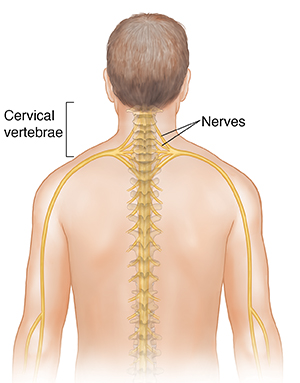A
B
C
D
E
F
G
H
I
J
K
L
M
N
O
P
Q
R
S
T
U
V
W
X
Y
Z
Click a letter to see a list of medical procedures beginning with that letter.
Click 'Back to Intro' to return to the beginning of this section.
Understanding Cervical Radiculopathy

Cervical radiculopathy is irritation or inflammation of a nerve root in the neck. It causes neck pain, weakness, or numbness that may spread into the shoulder or down to 1 or both arms. To understand this condition, it helps to understand the parts of the spine:
-
Vertebrae. These are bones that stack to form the spine. The cervical spine contains the seven vertebrae in the neck.
-
Disks. These are soft pads of tissue between the vertebrae. They act as shock absorbers for the spine.
-
The spinal canal. This is a tunnel formed within the stacked vertebrae. The spinal cord runs through this canal.
-
Nerves. These branch off the spinal cord. As they leave the spinal canal, nerves pass through openings between the vertebrae. The nerve root is the part of the nerve that is closest to the spinal cord.
With cervical radiculopathy, nerve roots in the neck become irritated or inflamed. This leads to pain and symptoms that can travel to the nerves that go from the spinal cord down the arms and into the torso.
What causes cervical radiculopathy?
Aging, injury, poor posture, and other issues can lead to problems in the neck. These problems may then irritate nerve roots. These include:
-
Herniated or bulging disk in the cervical spine. The herniated disk bulges out in the spinal canal and presses on nearby nerve roots.
-
Degeneration from wear and tear, and aging. This can lead to narrowing (stenosis) of the openings between the vertebrae. The narrowed openings press on nerve roots as they leave the spinal canal.
-
An unstable spine. This is when a vertebra slips forward. It can then press on a nerve root.
There are other, less common causes of pressure on nerves in the neck. These include infection, cysts, and tumors.
Symptoms of cervical radiculopathy
These include:
-
Neck pain that increases with certain neck movements
-
Pain, numbness, tingling, or weakness that travels down 1 or both arms
-
Limited neck movement due to pain
-
Weakness in the muscle movements of arm, shoulder, or hand
Treatment for cervical radiculopathy
In most cases, your healthcare provider will first try treatments that help relieve symptoms. These may include:
-
Prescription or over-the-counter pain medicines. These help relieve pain and swelling.
-
Cold packs. These help reduce pain and inflammation within the first 24 to 48 hours after the pain begins. Moist heat may be advised after 48 hours to relax muscles.
-
Resting. This involves staying away from positions and activities that increase pain.
-
Neck brace (soft cervical collar). This is for short-term use to rest the neck muscles by limiting neck motion.
-
Physical therapy, including exercises and stretches. This can help decrease pain and increase movement and function.
-
Shots (injections) of medicines (steroids) around the nerve roots. This is done to ease inflammation and pain. Repeat injections may be needed.
In many cases, cervical radiculopathy can get better with time without surgery. In some cases, your healthcare provider may advise surgery to fix the underlying problem. This depends on the cause, the symptoms, and the length of time you have had pain.
Possible complications
Over time, an irritated and inflamed nerve may become damaged. This may lead to long-lasting (permanent) numbness or weakness. If symptoms change suddenly or get worse, let your healthcare provider know.
When to call your healthcare provider
Call your healthcare provider right away if you have any of these:
-
New pain or pain that gets worse
-
New or increasing weakness, numbness, or tingling in your arm or hand
-
Bowel or bladder changes
Online Medical Reviewer:
Mahammad Juber MD
Online Medical Reviewer:
Raymond Kent Turley BSN MSN RN
Online Medical Reviewer:
Rita Sather RN
Date Last Reviewed:
9/1/2023
© 2000-2024 The StayWell Company, LLC. All rights reserved. This information is not intended as a substitute for professional medical care. Always follow your healthcare professional's instructions.